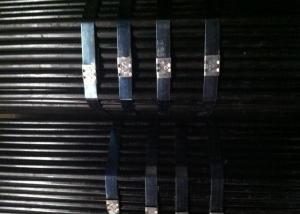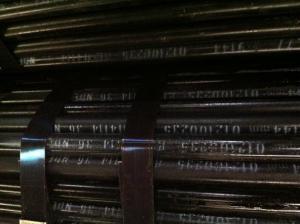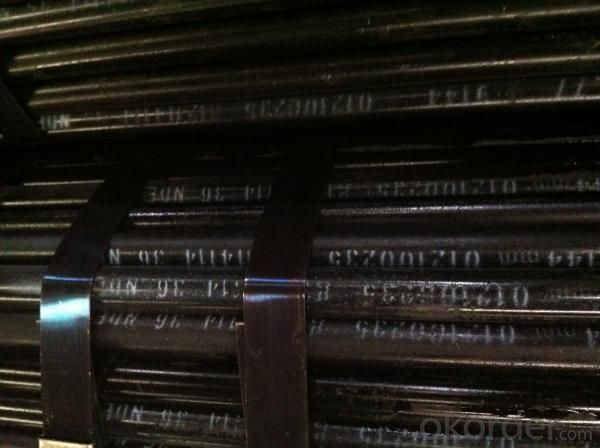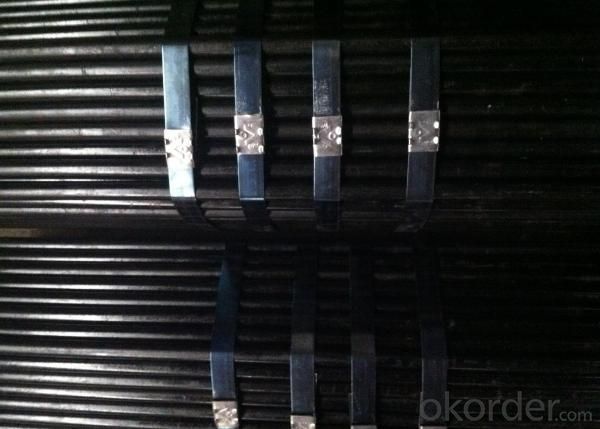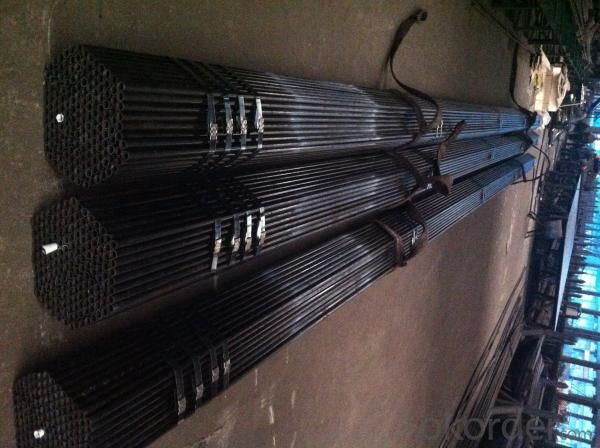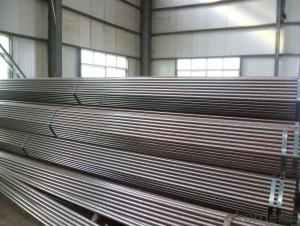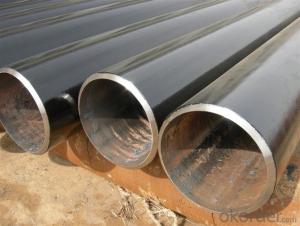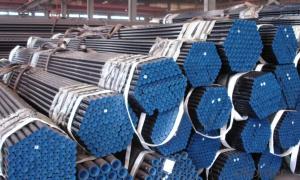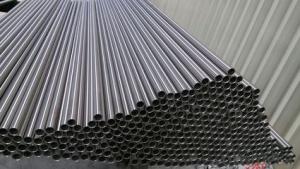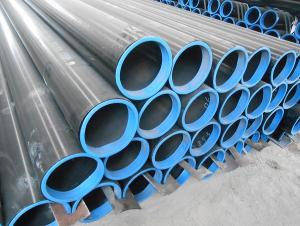High Temperature Seamless Carbon Steel Pipe
- Loading Port:
- China Main Port
- Payment Terms:
- TT or LC
- Min Order Qty:
- 20MT m.t.
- Supply Capability:
- 5000 Tons Per Month m.t./month
OKorder Service Pledge
OKorder Financial Service
You Might Also Like
Specifications of High Temperature Seamless Carbon Steel Pipe:
Standard : ASTM A106/ASME SA106
Main steel pipe grade : A106A 、 A106B 、 A 106C etc. (Other grade is also negotiable.)
Chemical Composition(%)&Mechanical Propertise :
Standard
Grade
Chemical Composition(%)
C Mn Si Cu Ni Cr Mo V P S
ASTMA106/ ASMESA106
Mechanical Propertise
Tensile Strength(Mpa)
Yield Strength(Mpa)
A
≥ 330
≥ 205
B
≥ 415
≥ 240
C
≥ 485
≥ 275
Usage/Applications:It is used for conveying water,petroleum,gas and other common fluids.
Packaging & Delivery:
Each bundles pipes will be bundled with 6-8 pcs steel strips and with shipping marks and 2 nylon strips
40-50 days delivery on china port upon receiving orinigal LC or prepayment.
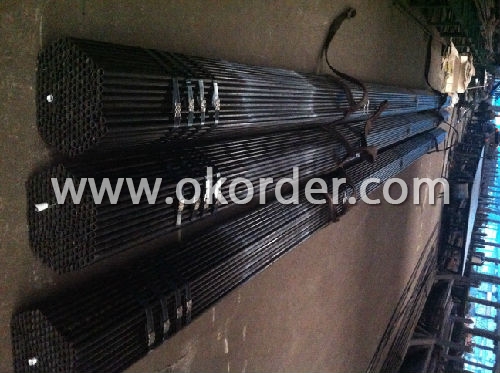
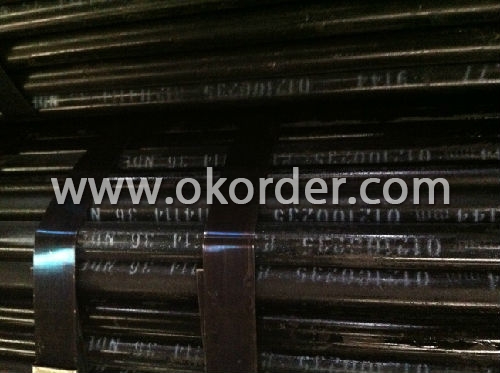
- Q: How to calculate the maximum bending stress of steel pipe? Is there a list of the maximum flexural normal stresses for steel pipes of different materials and diameters?
- Wnx - net sectional modulus of steel tubes, also called net sectional resistance moment. If the section is not weakened, it can be found in the steel sheet of the steel structure design manual. If the section is weakened, it can be calculated by the formula according to the sectional dimension according to the formula of the material mechanics.
- Q: What are the different types of steel pipe coatings for nuclear power plants?
- There are several different types of steel pipe coatings used in nuclear power plants. These include epoxy coatings, fusion bond epoxy (FBE) coatings, polyethylene (PE) coatings, and coal tar enamel (CTE) coatings. Each coating has its own specific properties and advantages, such as corrosion resistance, chemical resistance, and abrasion resistance, to ensure the durability and longevity of the steel pipes in the demanding nuclear power plant environment.
- Q: How are steel pipes recycled at the end of their life cycle?
- Steel pipes are typically recycled at the end of their life cycle through a process called steel scrap recycling. This involves collecting the used pipes, cleaning them to remove any contaminants, and then shredding or cutting them into smaller pieces. These pieces are then melted down in a furnace to create new steel products, including pipes. The recycled steel pipes are then ready for use in various industries, reducing the need for new production and conserving valuable resources.
- Q: How do you transport steel pipes safely?
- Transporting steel pipes safely requires proper planning, equipment, and adherence to safety measures. Here are some guidelines to ensure the safe transportation of steel pipes: 1. Choose appropriate transportation equipment: Use a flatbed trailer or a truck with a flatbed to transport steel pipes. Ensure that the trailer or truck has a strong and secure tie-down system to prevent the pipes from shifting during transit. 2. Secure the pipes: Use nylon or steel straps to secure the steel pipes to the trailer or truck bed. Make sure the straps are tightened properly, evenly distributing the weight of the pipes and preventing any movement or shifting. 3. Protect the pipes: Use pipe chocks or padding materials such as foam or rubber to prevent the pipes from rolling or rubbing against each other during transportation. This helps to minimize potential damage and maintain the integrity of the pipes. 4. Observe weight limits: Ensure that the weight of the steel pipes being transported does not exceed the load capacity of the transportation equipment. Overloading can lead to instability and compromise safety. 5. Follow road safety regulations: Adhere to all local traffic laws and regulations, including speed limits and securing all necessary permits or licenses for oversized loads if required. Additionally, use hazard warning signs or flags when transporting long or oversized steel pipes to alert other road users. 6. Conduct regular inspections: Before starting the journey, inspect the straps, tie-downs, and other securing mechanisms to ensure they are in good condition. Regularly check the load during transit to ensure it remains secure. 7. Plan the route: Choose a route that is suitable for the size and weight of the steel pipes being transported. Avoid roads with low bridges, narrow lanes, or weight restrictions that may pose a risk to the safe transportation of the pipes. 8. Consider weather conditions: Take into account weather conditions, such as strong winds or heavy rain, which can affect the stability of the load. Adjust the transport plan accordingly or delay the journey if necessary. 9. Train and educate drivers: Ensure that the drivers responsible for transporting steel pipes are well-trained and aware of the proper procedures for securing and transporting the load safely. Regularly update them on safety protocols and any changes in regulations. By following these guidelines, you can transport steel pipes safely, minimizing the risk of accidents, damage to the pipes, and ensuring the safety of everyone involved in the transportation process.
- Q: Can steel pipes be used for gas lines?
- Yes, steel pipes can be used for gas lines. Steel pipes are commonly used for gas lines due to their durability, strength, and resistance to extreme temperatures. They are able to withstand high pressure and are typically coated with corrosion-resistant materials to ensure the safety and longevity of the gas line system.
- Q: What is the difference between Schedule 40 and Schedule 80 steel pipes?
- The main difference between Schedule 40 and Schedule 80 steel pipes is their wall thickness. Schedule 80 pipes have a thicker wall compared to Schedule 40 pipes, making them more suitable for high-pressure applications and heavy-duty industrial use.
- Q: Are steel pipes suitable for underground installations in areas with high moisture content?
- Steel pipes are generally suitable for underground installations in areas with high moisture content. However, there are certain factors to consider when using steel pipes in such conditions. Corrosion is a major concern when steel pipes are exposed to moisture for extended periods. To mitigate this risk, it is important to use steel pipes that are specifically designed for underground installations and are coated with protective materials such as epoxy or polyethylene. These coatings act as a barrier between the steel and the surrounding moisture, preventing corrosion and extending the lifespan of the pipes. Additionally, proper installation techniques, including adequate pipe bedding and backfilling, should be followed to ensure the pipes are properly supported and protected from external forces. Regular inspection and maintenance are also recommended to identify any signs of corrosion or damage and address them promptly. Overall, with the right precautions and maintenance, steel pipes can be a suitable choice for underground installations in areas with high moisture content.
- Q: What's the difference between the fastener type steel pipe scaffold, the floor type steel pipe scaffold and the overhanging type steel pipe scaffold?
- Butt fastener: used for connecting two steel pipe joints.The base and the pad: is set up in the bottom of the pedestal pole, pay attention to the distinction between base and the base plate, usually with steel plate and welded steel pipe, base usually put on a backing plate, and the plate can be wood can also be plate.The foot board (see the diagram below), safety net (no explanation, this is very simple).
- Q: What are the advantages of using steel pipes in construction?
- There are several advantages of using steel pipes in construction. Firstly, steel pipes are incredibly strong and durable, making them suitable for carrying heavy loads and withstanding extreme weather conditions. Secondly, steel pipes have a high resistance to corrosion, which ensures their longevity and minimizes maintenance costs. Additionally, steel pipes are versatile and can be easily customized to fit specific project requirements. Lastly, steel pipes are fire-resistant, making them a safer choice for construction purposes. Overall, the use of steel pipes in construction offers strength, durability, corrosion resistance, versatility, and fire safety.
- Q: Can steel pipes be used for industrial ventilation systems?
- Yes, steel pipes can be used for industrial ventilation systems. Steel pipes are commonly used in such systems due to their durability, resistance to high temperatures, and ability to handle high airflow volumes. They are also cost-effective and can be easily fabricated to meet specific requirements of an industrial ventilation system.
1. Manufacturer Overview
| Location | Jiangsu, China |
| Year Established | 2005 |
| Annual Output Value | Above US$100 Million |
| Main Markets | Main land; Middle East; Southeast Asia |
| Company Certifications | ISO 9001:2008 |
2. Manufacturer Certificates
| a) Certification Name | |
| Range | |
| Reference | |
| Validity Period |
3. Manufacturer Capability
| a) Trade Capacity | |
| Nearest Port | Shanghai |
| Export Percentage | 61% - 70% |
| No.of Employees in Trade Department | 390People |
| Language Spoken: | English; Chinese |
| b) Factory Information | |
| Factory Size: | Above 600,000 square meters |
| No. of Production Lines | Above 10 |
| Contract Manufacturing | OEM not offered |
| Product Price Range | Average |
Send your message to us
High Temperature Seamless Carbon Steel Pipe
- Loading Port:
- China Main Port
- Payment Terms:
- TT or LC
- Min Order Qty:
- 20MT m.t.
- Supply Capability:
- 5000 Tons Per Month m.t./month
OKorder Service Pledge
OKorder Financial Service
Similar products
Hot products
Hot Searches
Related keywords
